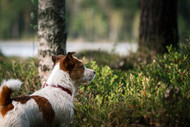Separation anxiety with dogs post covid
Posted by Darren Walton on 19th Aug 2021
Back to work post Covid? Helping your pet cope with separation anxiety.
Separation related behaviour – often known as separation anxiety – is behaviour which only happens when the pet is separated from the owner usually because the pet is feeling distressed. Some behaviour will be easy to spot; such as telltale destructive behaviour, howling or barking or soiling. However, other signs may be less obvious such as pacing, whining etc. In fact, research suggests 80% of dogs will find it hard to cope when left alone but owners will never notice. In order to be sure we would suggest filming your dog when it is left home alone.
Common signs to look out for include:
- Destructive behaviour – chewing or destroying furniture.
- Vocalisation – howling or barking.
- Soiling.
- Trembling, whining or pacing.
- Excessive salivating.
- Self mutilation – chewing or over grooming.
- Vomiting.
Helping your dog cope with separation anxiety can be achieved in a number of ways:
Try taking your pet for a walk around 30mins before you intend to leave. This will allow them to exercise and go to the toilet. Ideally feed a small meal on your return -this combination will encourage your dog to relax whilst you are away.
Try to minimise disturbance from outside – close the curtains to muffle any sounds and reduce the likelihood of your pet being disturbed be someone passing the window. Leaving a radio on to disguise outside noises will also help reduce disturbance when your pet is home alone.
Leave a ‘special dog toy’ – this should be a toy that your pet only has whilst you are out of the house. Ideally make it a mentally stimulating toy such as a treat dispenser, a flavoured chew or a stuffed kong so that it keeps you dog entertained whilst you are away.
You should not punish you pet when you return if they have misbehaved – physically punishing or shouting at your pet will only make the anxiety worse as they will then worry about what will happen the next time you return home. Moreover, your pet will not associate your anger with their earlier, forgotten behaviour.
For dogs with severe anxiety you may need to consider engaging a dog sitter to keep them company whilst you are away from home.
There are a number of products which may help your dog cope with anxiety and make them feel more comfortable in the home. Adaptil Diffusers can be very useful – these provide a natural solution by diffusing dog appeasing pheromones throughout the room – the pheromone comforts and reassures you dog (or for cats use Feliway) reducing anxiety levels. Zylkene capsules are a novel, natural remedy for dogs or cats, which can be used on an ongoing basis. Alternatively, TheComfort Zone Calming Vest with Complete Comfort Compression Technology provides gentle pressure that mimics swaddling to help reduce stress and make your dog feel safer.
It is often difficult to recommend one approach over another and often only by trialling different methods will you find one that works for your animal. Sometimes a combination of factors will be needed to settle your pets separation anxiety.

